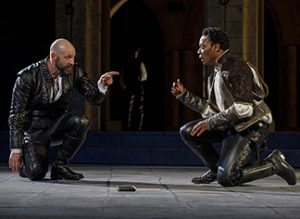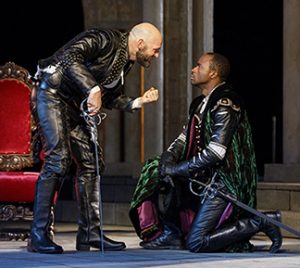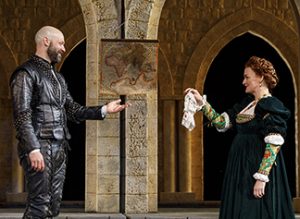By Lucy Komisar

Shakespeare‘s “Othello” at the Delacorte Theater in Central Park seemed more about racism to me than it ever had before. Under the clear, commanding direction of Ruben Santiago-Hudson and featuring the mesmerizing, almost painfully gut-wrenching acting of Chukwudi Iwuji as Othello, you imagine what a lifetime of racial slights has done to his judgment and trust.
How else can you believe that this general who rose to prominence as a military strategist in the 16th-century Venetian wars with the Turks is so foolish as to trust the fawning, manipulative Iago about the perfidy of his new wife, the aristocratic — and white — Desdemona (the very good assertive Heather Lind).

Racist remarks come from the start, when her father can‘t believe an anti-black upbringing didn‘t work, that “she, in spite of nature, of years, of country, credit, everything, to fall in love with what she feared to look on!”
Othello is brought down by the “scurvy” plotting of Iago (Corey Stoll), his ensign, who was passed over for promotion to be his lieutenant. That went to Cassio (a fine Babak Tafti).
The resourceful Iago gets Cassio drunk to destroy his reputation before Othello, then gets a na¯ve fool, Roderigo (Motell Foster), who fancies himself Desdemona‘s lover, to attempt to run Cassio through with a sword.

This could happen only because backstopping racism, and foolishness, is very strong sexism. Reptilian Iago is nasty about women. Othello shares some of his sexism, which labels women as morally weak, and that makes him easier to deceive into believing she is sleeping with Cassio, or others.
But that view of women was pervasive. Authorities immediately grab Bianca (the excellent Flor de Liz Perez), Cassio‘s lady-friend, when Iago declares, with no proof, that she is a “strumpet” and had a role in the attack on Cassio, who suffered a leg injury from Roderigo’s sword. (Iago conveniently knifes Roderigo to remove a witness.)
What is wrong with these men who Iago can lead by the nose? Iwuji‘s screaming crazed fury shows you a clouded mind.
Stoll is an excellent foil as the crude, clever Iago. He exhales villainy.

My hero of the story is Iago‘s wife Emilia (the cool, self-controlled Alison Wright), who seems the only one to understand that all the plotting has been not about sex but about power, that “some eternal villain, some busy and insinuating rogue…to get some office…devised this slander.”
She had given Iago Desdemona’s handkerchief which she picked up where the lady dropped it, but when she discovers Iago told Othello it was found in Cassio’s rooms, the gutsy lady proclaims the truth.
It‘s a gorgeous production with black and gold costumes back-dropped by Venetian sandstone arches. Black leather pants suggest a mood of the present. Iago also has a black leather jacket, the back lined with tough-guy studs. (Costumes are by Toni-Leslie James, set by Rachel Hauck.)
And Shakespeare‘s 17th-century message about men? Still pertinent.
“Othello.” Written by William Shakespeare; directed by Ruben Santiago-Hudson. The Public Theater at the Delacorte, Central Park West at 81st Street, New York City. Opened June 18, 2018; closes June 24, 2018. runtime 2:50hrs. 6/18/18.

